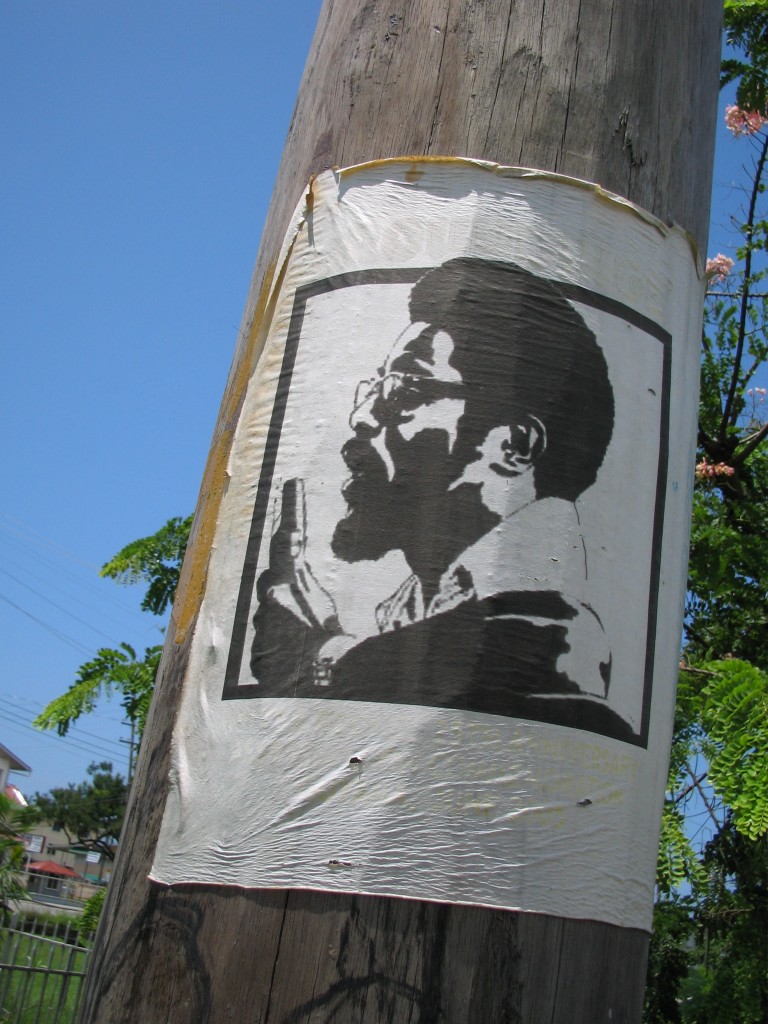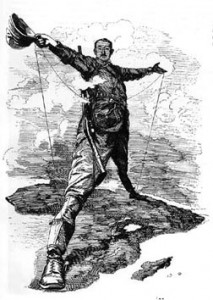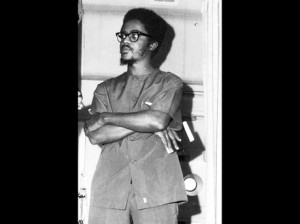Pan-African Classics: Walter Rodney’s Legacy Ideas
Books, New in Ceasefire - Posted on Monday, January 6, 2014 20:21 - 2 Comments
By Amber Murrey

Walter Rodney’s How Europe Underdeveloped Africa (1972) transformed the way we understand the legacy of slavery and colonization in Sub-Saharan Africa, providing a rich understanding of the historical economic and political structures that create and perpetuate globalized inequalities.
I read Rodney’s bold, clear and rich work as an introductory text for Syracuse University’s Masters programme in PanAfrican Studies. Rodney’s book provided inspiration, invigoration, sustenance; more, though, it outlined the historical frameworks of violence and domination through which contemporary maldevelopment, domination and plunder unfold. His work and commitment to ‘bread and justice’ inspired my budding examinations of the material and lived consequences of structural violence.
The premise of Rodney’s historical socio-economic analysis in How Europe Underdeveloped Africa is that the poverty and inequalities of Sub-Saharan Africa are reflections of historical relationships of exploitation. This exploitation, he argues, was total: countries were dispossessed of all resources deemed useful to Europeans, including human labour.
In his assessment of pre-colonial and colonial European systems of exploitation, Rodney demands that readers confront the historical roots of ‘underdevelopment’ and he challenges us to rethink global history through Africa, self-emancipation and the politics of domination and resistance.
In the first section of his book, Rodney explores African cultures prior to European contact (pre-1500 A.D.). During this epoch, Sub-Saharan African societies were arranged largely according to communal models of family relations. Members of extended families were allowed equal access to land, labour and resources as no class system existed. As a result of the lack of competition for resources, little population pressure and the tendency of religion to remain unchanged for long periods of time (as opposed to the religious shifts of feudalist Europe, namely secularization which, Rodney argues, eased Europe into capitalism), these societies had relatively low technical knowledge or production skills.
Rodney discusses several examples of African pre-European civilization including the Fatimid Dynasty in Egypt, the Kingdom of Axum in Ethiopia, the Nubians of Sudan and the Amazighs of Morocco, Algeria and Tunisia; societies which were influenced by contact with foreign peoples, had developed advanced systems of production (including Nubian ironing and smelting) and had extensive knowledge of ecology. As livestock and resources became unevenly distributed, complex systems of social stratification emerged, often involving large servant and slave classes.
Trade brought Western Europe and Africa into contact in the late fifteenth century. From the beginning, Europe exploited this trade relationship—which Rodney refers to as the “robbery of Africa” (later reflected in the work of Patricia McFadden on the neocolonial extensions of militarized institutions into African civil society alongside brutal accumulation practices).
First, European traders imposed trading laws that established the price of products and freight rates and painstakingly separated pre-existing trading systems, meaning that Africans were required to sell goods to European middlemen who then resold the goods for a profit to neighbouring Africans. European ships departed African shores with holds full of profit and returned to those same shores with cast-off, outdated and non-usable goods. It can be contended that this cast-off system continues today—often under the façade of development—as corporations donate blankets, expired pharmaceutical products, or used shoes to promote “development” (a la Hancock’s Lords of Poverty).
Throughout Rodney’s work, we hear the echoes of history in our contemporary conjuncture. My dissertation project, which looks at experiences of structural violence along the Chad-Cameroon Oil Pipeline, owes much to Rodney’s historical framework, political influence and methodological approach.
Although he didn’t employ the term ‘structural violence’, How Europe Underdeveloped Africa illustrates the mechanisms and processes that impose frames of pre-colonial and colonial domination and exploitation that persist in neoliberal capital domination today. Likewise, Europeans established complete lending monopoly and extracted huge profits through high interest rates (Léonce Ndikumana and Jame K. Boyce have since examined the role of ‘odious debt’ in perpetuating African underdevelopment).
 Second, Europe established total ownership of the means of production. This entailed European ownership of African land, minerals, banks, factories, mines, newspapers, means of transport and power stations. During this period, exchange with Africa unequivocally promoted European development by contributing large amounts of raw material (gold, ivory, gum, land, labor) to Europe’s economy.
Second, Europe established total ownership of the means of production. This entailed European ownership of African land, minerals, banks, factories, mines, newspapers, means of transport and power stations. During this period, exchange with Africa unequivocally promoted European development by contributing large amounts of raw material (gold, ivory, gum, land, labor) to Europe’s economy.
This large influx of product stimulated further advances in Western European society: as factories were pressured to refine goods, science responded to create new technologies; these refined products were then sold to developing middle- and working-classes, pouring profit back into European economies, initiating further growth. Western Europeans, for example, made advancements in their ship building capacity and expanded their port systems alongside the expansion of global trade (Rodney 1972).
At the same time that Europe was experiencing vast economic and developmental advancements through African trade, African development potentials were negatively affected. Indeed, it seems that Rodney could have selected the title, How Africa(ns) Developed Europe, so completely did the work debunk the myth of social evolution and undermine the development paradigm of the later half of the twentieth century.
From 1445 to 1870, Africans were systematically and violently enslaved and taken from their homeland and transported to the ‘New World’. Rodney titles this section of the text, “The European Slave Trade as a Basic Factor in African Underdevelopment,” and explains, ‘The title of this section is deliberately chosen to call attention to the fact that the shipments were all by Europeans to markets controlled by Europeans, and this was in the interest of European capitalism and nothing else’ (Rodney 1972, p. 95).
During this time, millions of able-bodied people from the West Coast of Africa were forcibly removed from their homes to become slaves on European plantations in the Americas. Although slavery affected different spaces and societies differently, slavery amounted to the gravest theft of development for the entire continent of Africa. Farming routines were upset and famines created because of the deportation of human labour in Africa. Rodney boldly questions, ‘What would have been Britain’s level of development had millions of [its people] been put to work as slaves outside of their homelands over a period of four centuries?’ (Rodney 1972, p. 101).
With the development of European imperialism and the expansion of capitalism, slave labour no longer ‘assisted in European development’ (Rodney 1972, p. 88). In its place, colonization continued to exploit African labour and resources as the continent was divided between Western European countries. Although various parts of Africa had been able to militarise (see the history of Shaka Zulu, who united the various small Ama-Zulu tribes of South Africa, for example), nation-states were scattered and the continent was divided in the face of European power.
Under colonialism, Africans were paid significantly lower wages than European counterparts (patterns which persist today in international development frameworks in which expats are incentivised to relocate to the global South). Peasants were forced to transition to cash crop farming, often under violent force.
Colonialism promoted the development of a monoculture in Africa that led to famines, malnutrition and chronic hunger (the recent scholarship on the constructed-ness of famine in Sudan and the African Sahel echoes Rodney’s earlier arguments). At the same time, European companies charged Africans more for trade goods than they charged on any other continent. Africans were often prohibited from owning businesses, and foreign banks effectively dispossessed Africa of its wealth by investing huge profits in European markets.
During this time, ‘Previous African development was blunted, halted and turned back. In place of the interruption, nothing of compensatory value was introduced’ (Rodney 1972, p. 224). Rodney’s scathing report continues: Culturally, colonialism created a loss of autonomy that engendered an internalization of a sense of incapability (or the colonization of the subconscious as noted by Fanon, Memmi, Césaire) alongside an educational system that was underfunded and focused on teaching Eurocentric topics that reinforced the morals and values of the colonial powers; a deterioration in the status of women; a decrease in African internal trade (only 10 per cent of African trade at this time was internal, according to Rodney); and a system of occasionally violent tribalism as diverse peoples were brought together and pitted against one another to best suit the interests of colonialism.
Arguments that Europeans ‘helped’ Africans through the building of colonial schools, hospitals, roads and police stations are inherently flawed: Colonial taxation—taxes imposed by Europeans on Africans—paid for all of these ‘advancements.’ Public services were foremost intended to benefit Europeans living in African colonies. Health rates decreased in most colonial states, despite the increase in hospitals.
 Aside from the enormous monetary profits, Europe experienced serious non-monetary profits as colonialism financed scientific research into industry, including the most effective processing techniques for raw materials and the refrigeration of goods across long distances.
Aside from the enormous monetary profits, Europe experienced serious non-monetary profits as colonialism financed scientific research into industry, including the most effective processing techniques for raw materials and the refrigeration of goods across long distances.
Colonialism increased employment opportunities in Europe as more raw materials were imported and new business opportunities opened up, leading to increases in the skill levels of the European workforce (Rodney 1972).
Colonialism ended less than fifty years ago in most African countries (Zimbabwe and South Africa’s apartheid as notable exceptions), but its legacy endures in a defining way. Neocolonialism continues throughout the continent through structural dependencies and the persistent cultural dominance of neocolonial powers, exemplified by the high levels of foreign influence, the use of colonial languages, and the endurance of colonial educational systems.
In countries like Cameroon, current presidents can be traced back to colonial decision-making. The continued legacy of corporate power in African spaces – visible, for example, in the ‘land grab’ phenomenon following the 2008 ‘global financial crash’ and the land policies of countries like Cameroon, which directly favour foreign over domestic investment – was perhaps unanticipated by Rodney, who was so optimistic in the final chapters of the How Europe Underdeveloped Africa.
A tragic testimony to the powerful forces against resistance movements and political emancipation, Rodney was killed by a car bomb on the 13th of June 1980. He was 38 years old. It took 33 years for an International Commission of Enquiry to look into the circumstances of his assassination. In June 2013, at the behest of the Rodney family, the government of Guyana announced that it had approved the International Commission of Inquiry into Rodney’s assassination (follow the Walter Rodney Foundation for updates).
Rodney ends the book with a sense of optimism for self-emancipation, referring to the case of colonial Cameroon, where people participated in conscious activity to determine their own histories. Rodney understood Rastafarian belief, likewise, to be a major accomplishment in black mental decolonization and resistance and encouraged working people to mobilise in efforts to transform their society.
‘History is a weapon,’ he said in a speech by that name in 1979 and, indeed, he taught a complex and insightful historical understanding of the exploitative relationship between Europe and Africa. His conception of the role of race and class-consciousness continues to guide students of PanAfrican thought and resistance as the struggle continues.
2 Comments
Bob
No One Remembers Old Marcus Garvey? | Firm Meditation
[…] I, Patrice Lumumba, Ahmed Sékou Touré, Amiri Baraka, Kwame Ture, Julius Nyerere, George Padmore, Walter Rodney, Jomo Kenyatta and Muammar al-Gaddafi are a diverse (all men, though) but fairly representative […]



Fantastic bit of analysis, thank you for sharing. It’s always a sign of great work when we can read it years later with the same reverence. The book is available in pdf format online for free.